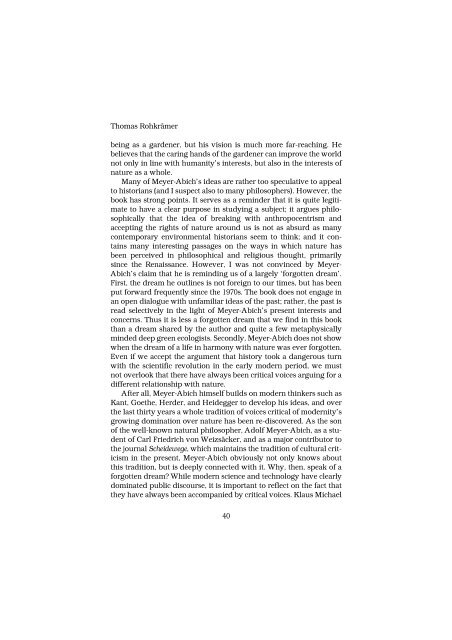Download - German Historical Institute London
Download - German Historical Institute London
Download - German Historical Institute London
You also want an ePaper? Increase the reach of your titles
YUMPU automatically turns print PDFs into web optimized ePapers that Google loves.
Thomas Rohkrämer<br />
being as a gardener, but his vision is much more far-reaching. He<br />
believes that the caring hands of the gardener can improve the world<br />
not only in line with humanity’s interests, but also in the interests of<br />
nature as a whole.<br />
Many of Meyer-Abich’s ideas are rather too speculative to appeal<br />
to historians (and I suspect also to many philosophers). However, the<br />
book has strong points. It serves as a reminder that it is quite legitimate<br />
to have a clear purpose in studying a subject; it argues philosophically<br />
that the idea of breaking with anthropocentrism and<br />
accepting the rights of nature around us is not as absurd as many<br />
contemporary environmental historians seem to think; and it contains<br />
many interesting passages on the ways in which nature has<br />
been perceived in philosophical and religious thought, primarily<br />
since the Renaissance. However, I was not convinced by Meyer-<br />
Abich’s claim that he is reminding us of a largely ‘forgotten dream’.<br />
First, the dream he outlines is not foreign to our times, but has been<br />
put forward frequently since the 1970s. The book does not engage in<br />
an open dialogue with unfamiliar ideas of the past; rather, the past is<br />
read selectively in the light of Meyer-Abich’s present interests and<br />
concerns. Thus it is less a forgotten dream that we find in this book<br />
than a dream shared by the author and quite a few metaphysically<br />
minded deep green ecologists. Secondly, Meyer-Abich does not show<br />
when the dream of a life in harmony with nature was ever forgotten.<br />
Even if we accept the argument that history took a dangerous turn<br />
with the scientific revolution in the early modern period, we must<br />
not overlook that there have always been critical voices arguing for a<br />
different relationship with nature.<br />
After all, Meyer-Abich himself builds on modern thinkers such as<br />
Kant, Goethe, Herder, and Heidegger to develop his ideas, and over<br />
the last thirty years a whole tradition of voices critical of modernity’s<br />
growing domination over nature has been re-discovered. As the son<br />
of the well-known natural philosopher, Adolf Meyer-Abich, as a student<br />
of Carl Friedrich von Weizsäcker, and as a major contributor to<br />
the journal Scheidewege, which maintains the tradition of cultural criticism<br />
in the present, Meyer-Abich obviously not only knows about<br />
this tradition, but is deeply connected with it. Why, then, speak of a<br />
forgotten dream? While modern science and technology have clearly<br />
dominated public discourse, it is important to reflect on the fact that<br />
they have always been accompanied by critical voices. Klaus Michael<br />
40













